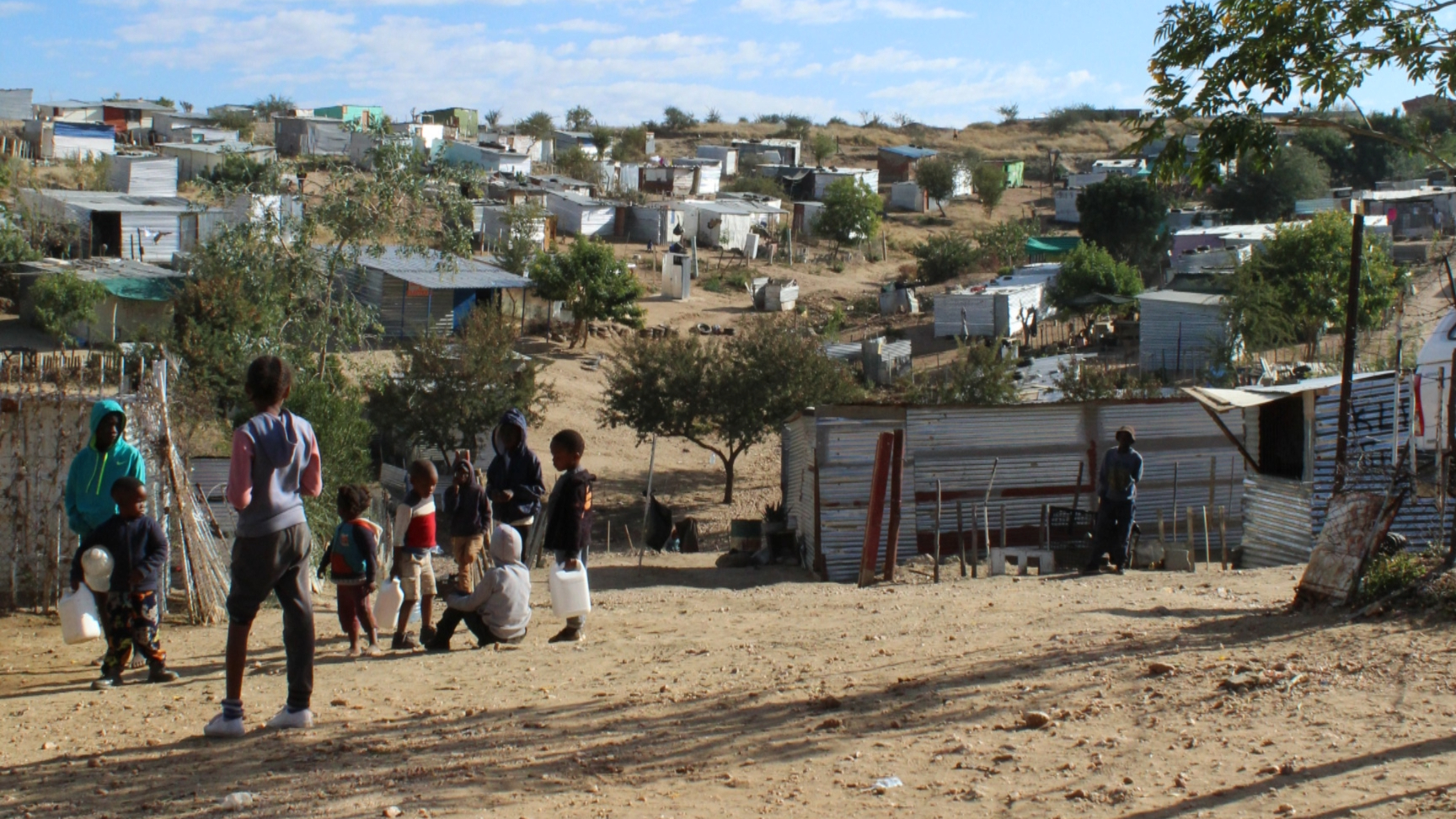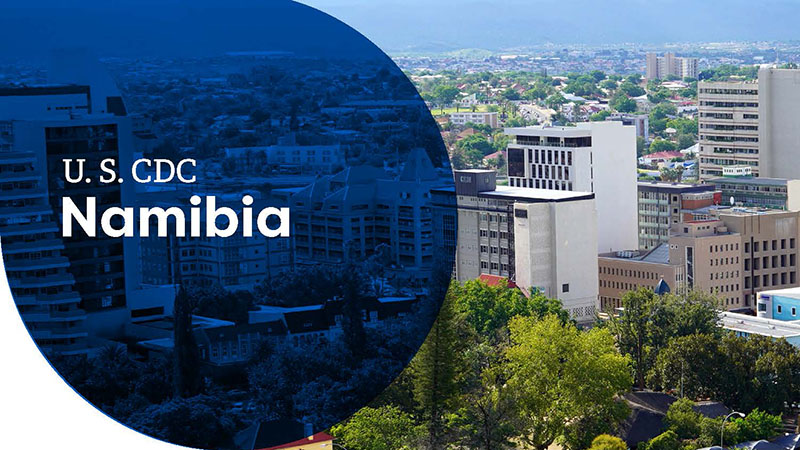At a glance
CDC works with the Ministry of Health and Social Services (MHSS) and other partners to build effective public health collaboration and partnerships, which strengthen the country's core public health capabilities: data and surveillance, laboratory capacity, workforce and institutions, prevention and response, innovation and research, and policy, communications, and diplomacy.

Overview

CDC established an office in Namibia in 2002. CDC Namibia works closely with the Government of Namibia, MHSS, and partner organizations to detect, prevent and control infectious disease outbreaks and build and strengthen the country's core public health capabilities. These include data and surveillance, laboratory capacity, workforce and institutions, prevention and response, innovation and research, and policy communications and diplomacy. CDC's work aims to protect the health of our nations and public health around the world.
CDC and MHSS work to control the HIV and TB epidemics through tailored prevention strategies. CDC also supports MHSS through a multi-pronged approach to strengthen and optimize:
- Clinical and laboratory systems, through the MHSS quality management framework
- Human resources to maintain an effective health workforce
- Health information systems to inform clinical care and policy making
Global health security
CDC strengthens emergency preparedness, provides technical support for infectious disease outbreaks, and supports border health services. CDC is also assisting the establishment of a national Emergency Operations Center and National Institute of Public Health. CDC and MOHSS strengthen the national health system by increasing workforce capacity to detect and respond to outbreaks.
Key achievements
CDC supports partners to strengthen global health security policies and procedures in Namibia. This helps build a stronger framework for disease outbreaks response.
Over the past 10 years, more than 220 participants have graduated from the Namibia Field Epidemiology and Laboratory Training Program (FELTP). Two cohorts graduated from FELTP-Frontline in 2022.
CDC Namibia has supported a range of outbreak investigations. These have included mpox, Crimean-Congo hemorrhagic fever, rabies among livestock with human exposures, anthrax in animals, cholera, typhoid, listeriosis, measles, scabies, hepatitis E, schistosomiasis, and H1N1 influenza.
Namibia joined the International Association of National Public Health Institutes (NPHIs) in 2016. CDC provides ongoing support to establish an NPHI in Namibia.
Namibia conducted a Threat and Hazard Identification and Risk Assessment evaluation in 2017, joined the Global Health Security Agenda in 2019, and launched a National Action Plan for Health Security in December 2020.
Workforce development
CDC supports human resources for health at the facility, district, regional, and national levels. CDC and MOHSS work together to make sure that staff are in the right place to meet local needs. Their partnership ensures that mechanisms are in place for rapid recruitment, deployment, and ongoing human resources management systems.
Key achievements
- CDC Namibia supports over 600 healthcare workers within the MOHSS. Staff provided over 2 million hours of work that benefited local and global health security.
- In 2022, CDC conducted an emergency preparedness capacity assessment. CDC helped train over 100 rapid responders in 4 regions.
Laboratory capacity building
Strong laboratory systems and networks enable timely detection of emerging diseases and rapid response to public health threats. Effective systems and networks also provide critical health information and create safer handling and transportation of laboratory samples. CDC supports the MOHSS to strengthen the quality of the national laboratory system in Namibia.
CDC provides technical and financial support to the Namibia Institute of Pathology (NIP) to ensure accurate testing services for TB, HIV, and other related conditions. CDC also works with NIP to ensure the quality of all HIV and TB testing across the country.
During the COVID-19 pandemic, CDC supported the national COVID-19 testing system to design workflows, conduct trainings, and ensure biosafety in the laboratory at all times. CDC also supports the development of testing protocols and procedures for specific diseases as outbreaks occur.
Key achievements
With CDC support, the Namibia Institute of Pathology introduced laboratory innovations such as barcode printers and delivery of results via text message. Both innovations decrease the time it takes to get results back to patients and providers
Namibia conducts all of the country’s COVID-19 testing and quickly increased capacity from zero tests per day at the start of the pandemic to more than 2,500 per day.
Early in the COVID-19 pandemic, Namibia’s testing laboratory had a backlog of over 10 days until test results were ready. With CDC support, test results are now reported within 24-72 hours after samples are received for testing.
Health information systems
CDC assists with a range of innovative and cost-effective strategies that enhance data collection, analysis, and health management and information systems. CDC supports MOHSS to maintain national health information systems that include HIV testing, treatment, PMTCT, TB, and COVID-19 cases and vaccinations.
CDC also supports the MOHSS with the national health information management system (District Health Information System or DHIS2). This system collects aggregated data and produces summary reports for key indicators. CDC’s support helps ensure that MOHSS staff, from health facilities up to the national programs, have access to the critical information they need to inform decision-making.
Key achievements
CDC supports integration and interoperability of data systems to ensure that patient-level data is available and used for decision-making that leads to improved client outcomes.
HIV and TB
As a key implementer of the U.S. President's Emergency Plan for AIDS Relief (PEPFAR), CDC plays an essential role in the fight against HIV and TB. With unmatched scientific and technical knowledge and long-standing relationships with ministries of health, CDC is uniquely positioned to advance HIV, TB, and other global health security activities that keep Americans safe at home and abroad.
Through PEPFAR, CDC provides critical support to Namibia's public health infrastructure, improving the country's ability to prevent, detect, and respond to HIV, TB, and other infectious diseases and minimizing their risk from entering the U.S.
COVID-19
Global health security investments and decades of global partnership built a strong foundation in Namibia to respond to the COVID-19 pandemic. CDC's history of supporting varying diseases such as HIV, TB, malaria, influenza, and polio were vital to the country's COVID-19 response. CDC's COVID-19 support in Namibia includes:
- Response and logistics coordination
- Enhancing diagnostic capacity
- Disease surveillance and case management
- Quarantine management
- Case investigation
- Infection prevention and control
- Risk communication
- Activities that promote vaccine uptake
Key achievements
- CDC technical staff were involved in all of the major COVID-19 response pillars in Namibia. Technical staff supported development of over 40 standard operating procedures, guidelines, flyers and letters issued by three different Ministries.
- CDC supported the development and use of an electronic data system, dashboards, and other tools that provide access to critical COVID-19 data.
- CDC helped purchase critical laboratory equipment, including: centrifuges, vortex mixers, biosafety cabinets, refrigerators, freezers, sequencing equipment, testing supplies and accessory equipment, reagents, and personal protective equipment.
- CDC supported COVID-19 vaccine roll-out by training healthcare providers.
